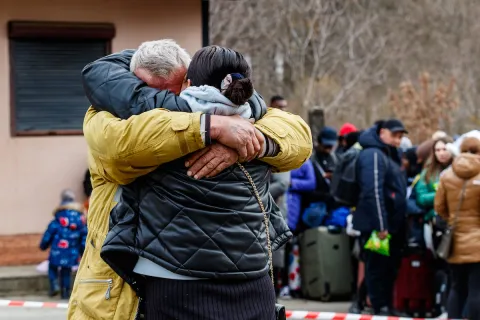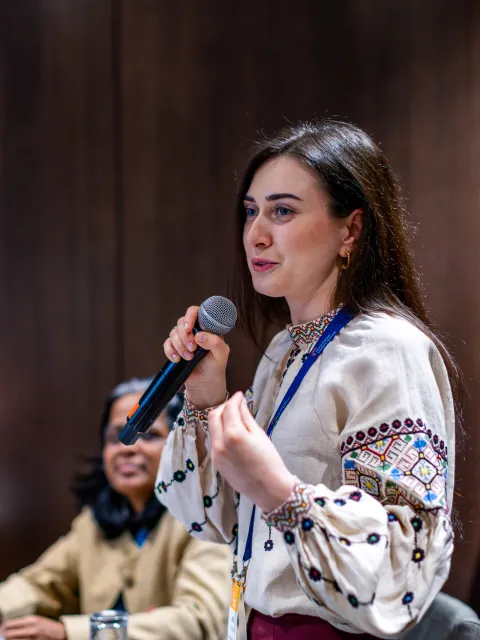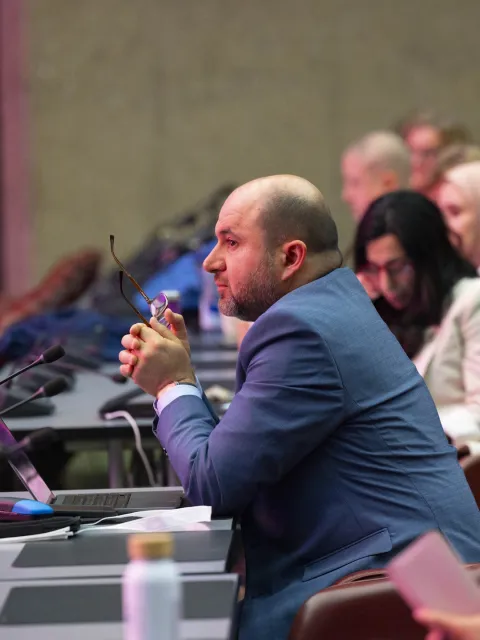Emergency funding for cancer care in Ukraine and neighbouring countries
UICC has disbursed the first grants from the Solidarity Fund for Ukraine, which was set up in March, and speaks with one of the grantees, Medical Laboratory CSD in Kyiv.

Shortly after the Russian invasion of Ukraine, UICC set up an emergency Solidarity Fund in response to its members’ requests to bridge funding into the region, to help organisations in Ukraine and the surrounding countries that support cancer patients affected by the conflict.
UICC is highlighting here the first five organisations in Ukraine and neighbouring countries to receive grants of up to USD 20,000 to support their work. UICC continues to receive and process applications and several more have already been selected. These organisations will be presented in future articles as the grants are disbursed.
Medical Laboratory CSD, Ukraine
Medical Laboratory CSD (“Care and Safe Diagnostics”) is specialised in pathology services and collaborates actively with an extensive network of hospitals and universities in Ukraine and abroad. It is one of the largest laboratories in the country, diagnosing some 30% of all malignant cases of cancer (there are about 160,000 total number of cases per year). The main facility was located in Kyiv but staff moved to a smaller facility in Lviv in Western Ukraine three weeks after the invasion began to continue their work. In May, however, all doctors and laboratory technicians were able to come back to Kyiv.
Oleksand Dudin, CEO of Medical Laboratory CSD, said that several institutions have been either destroyed or are totally blocked off by the conflict, notably in Mariupol, Kherson, and Melitopol in the southeastern region. Some are still operating but it remains extremely difficult for them to receive medicines, therapies, and pharmaceuticals.
“CSD was fortunate to have a warehouse with a sufficient supply of reagents to continue our work. Logistics, however, remain a challenge, not only for reagents but also for samples coming from conflict zones. The first thing that collapsed was our ability to send tests abroad to the Czech Republic, Germany or the US. A good turnaround time is important for test results and this is challenging.”
– Oleksand Dudin, CEO of Medical Laboratory CSD
CSD applied for a grant from the UICC Solidarity Fund to support breast cancer patients with the necessary histological examination that is of crucial importance in determining the appropriate treatment protocol. “Not all clinics are able to provide it now,” says Mr Dudin.
With funding from the grant, Medical Laboratory CSD will be able to provide women with diagnostic testing for breast cancer – the most common type of cancer in Ukraine. Breast core needle biopsy specimens will be tested for molecular diagnostic markers such as ER, PR, HER-2, Ki-67 and consultations and follow-up treatment will subsequently be provided by the relevant cancer centres. According to Mr Dudin, women should be able to get treatment quickly depending on their diagnosis, despite a lack of targeted therapy and large demand due to people migrating from the regions on the frontline of the war in central and western Ukraine.
“We're facing many problems, and one of the biggest is medical support for cancer patients. As someone said, ‘Now cancer patients have two wars in Ukraine’. The main aim of our laboratory was and is to help Ukrainians in this fight, and I can't thank enough all our friends and people who stand with Ukraine. What the team is doing now is just unbelievable and our help is important. With the strong support of UICC Solidarity Fund, we will be able to provide accurate, up-to-date diagnostic services for women who suffer from breast cancer. We are extremely grateful to UICC Solidarity Fund for Ukraine and The Advisory board for awarding us and letting us do our job and help Ukrainian patients.”
– Oleksand Dudin, CEO of Medical Laboratory CSD
Charitable Foundation Kvitna, Ukraine
The mission of the Charitable Foundation Kvitna in Ukraine is to provide informational and educational programmes aimed at improving the early diagnosis of breast cancer and reducing the number of related deaths.
With the grant from the UICC Solidarity Fund, Kvitna aims to help cover the operational costs of the National Cancer Institute in Ukraine to ensure that it can pursue its activities as best as possible in treating cancer patients. This includes purchasing medicines and tools that are lacking at the National Cancer Institute, where Ukrainians are currently treated for cancer.
"Today, every Ukrainian is fighting for his life and the life of his homeland, for his family, children and future. But there are people who, in addition to this war, are struggling with a terrible disease: cancer. With the support of UICC Solidarity Fund Ukraine, we will be able to help the National Cancer Institute to purchase the necessary supplies, equipment and medicines that they need today to recover and save lives."
– Grygoriy Kolodach, Director of Kvitna
Fundacja Onkologiczna Rakiety, Poland
As of 4 July, the number of Ukrainian refugees who have relocated to other countries in Europe – primarily Poland and other neighbouring countries – is estimated at 5.2 million. Many of them have had to rely on the support of volunteers, interpreters, families as well as medical teams who have provided safe transport, organised accommodations and offered health care.
The Fundacja Onkologiczna Rakiety or “Rockets Cancer Foundation” was established in 2012 to support people living with cancer throughout their patient journey. The project funded by the grant aims to extend that support to oncology patients and their families or friends who come to Poland because of the war in Ukraine.
Three types of activities will be carried out: a helpline, permanent assistance and financial help. The project is expected to last about a year and support 100 oncology patients from Ukraine.
“The war in Ukraine has changed many lives. In an instant, people had to reorganise everything: job, family life and, for cancer patients, the challenge of seeking new medical options. The sudden interruption of chemotherapy, radiation therapy or other treatment presents a great risk to a person with cancer, the risk of a drastic, negative change in health. Since the beginning of the war our foundation has received many requests for help. These requests cannot be ignored. We wish to make the life of cancer patients from Ukraine as comfortable as possible in Poland. It is not easy, as we are talking about people deprived of stability, accommodation and even money. The grant given by UICC Solidarity Fund for Ukraine will surely expand the scope of our activities and allow us to fully refund costs of medicines, treatment, transport, accommodation and other social welfare costs. Ukrainian oncological patients can only depend on the kindness and selflessness of people – our Foundation and the UICC Solidarity Fund together can bring the change they are looking for.”
– Maya Surowicz-Bilyj, CEO, Fundacja Onkologiczna Rakiety
Fundatia Youth Cancer Europe (YCE), Romania
The Youth Cancer Europe Foundation unites youth cancer networks across Europe. it is specifically dedicated to serving young people with cancer, to act as a “bridge between childhood and adult cancer patients, across tumour types."
YCE received a grant for its Ukrainian Crisis Response Project, which helps Ukrainian cancer patients continue their treatment abroad in a safe environment. The first priority, says Katie Rizvi, Founder of Fundatia Youth Cancer Europe, is for the patients and their families to reach safety in one of the neighbouring countries. Then they need to navigate local health systems and find the best possible solution according to their diagnostic and medical history.
“We would like to express our heartfelt appreciation for the support received from the UICC Solidarity Fund for Ukraine. Youth Cancer Europe was one of the first organisations to offer operational support to Ukrainian patients needing continued cancer therapy in European countries and has since assisted hundreds of cancer patients and their families to gain access to safe and appropriate housing, food and social care. While our sincere wish for all cancer patients and Ukrainian refugees is to be able to return to their homes and rebuild their lives in safety and good health, we know that, unfortunately, this is still not a reality. With more than 80% of oncology facilities in the country reporting diminished activities and hundreds of vital infrastructures now destroyed, Ukrainian cancer patients will need our continued support for a long time to come. We are grateful for UICC’s critical support, without which we would be simply unable to do our work.”
– Katie Rizvi, Founder of Fundatia Youth Cancer Europe
Blue Heron Foundation, Moldova/Romania/United States
The Blue Heron Foundation is a charitable organisation that operates in the US, Moldova and Romania, and its primary mission is to extend support to and ensure the well-being of Romanian and Moldovan orphaned and abandoned youth.
The Foundation extended its activities after the Russian invasion of Ukraine, providing medicines and medical equipment from Romania to hospitals in Ukraine. It is also collaborating with Project Hope and has developed a cancer care programme for Ukrainian patients, partnering with other foundations to support Ukrainian refugees arriving in Romania and Moldova.
The grant received through the Solidarity Fund will:
- evaluate patients by means of multidisciplinary tumour boards;
- triage to most appropriate oncology centres in Romania;
- assist patients and their families with administrative tasks to support the transfer;
- provide transportation, interpretation services and housing while undergoing treatment in Romania;
- provide emotional support and medical follow up by social workers and nurse navigators.
"The Solidarity Fund grant is of enormous help to Blue Heron’s efforts to assess and provide treatment to Ukrainian cancer patients who desperately need to initiate or continue their cancer therapy and are stranded in Moldova or the Ukraine. We will now be able to begin covering their treatment costs, coordinating logistics and facilitating translation, transportation and housing. Thank you UICC Solidarity Fund Ukraine!”
– Stefania Magidson, President, Blue Heron Foundation
“Much of this work is possible thanks to the generosity of the UICC and its Solidarity Fund for Ukraine, which supports our program coordinators on the ground, and enables us to address each patient's unique set of needs in their journey to cancer care.”
– Horia Vulpe, MD, CM, FRCPC
Last update
Thursday 25 August 2022
